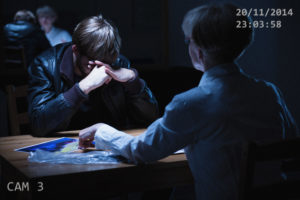An involuntary confession cannot be used in California courts.
We are all influenced by popular culture. Many of us are big fans of crime and legal dramas, and have picked up a fair amount of lingo along the way. That’s why so many of us cannot fathom why someone would falsely confess to a crime, and assume that if a person says that they did something wrong — especially something heinous, like rape or murder — it must be true. Yet in many cases, these confessions are completely false, and are the product of coercion by the police. And instead of capturing the true bad guy, an innocent person is locked up while a criminal is free to roam the streets.
As Riverside criminal defense lawyers, we have seen our share of coerced confessions that are the result of police tactics that are unfair and simply wrong. A coerced confession is one that is involuntary because it is the result of overbearing police conduct instead of a defendant’s free will. In other words, the statement or confession is not a result of the suspect’s choice; instead, it is a manipulation by the police. It could be a result of physical abuse, or more subtle psychological tactics that are designed to bully, intimidate, confuse or exhaust a suspect in a criminal case. In many situations, a suspect will confess to a crime just because he wants the police to stop whatever it is that they are doing.
Many people are familiar with the Netflix series “Making a Murderer.” The show examined the 2005 murder of Teresa Halbach for which a man, Steven Avery, and his nephew, Brandon Dassey, were ultimately convicted. In June 2017, a federal appeals court ruled that Dassey’s confession to his part in the crime was coerced. At the time that Dassey was interrogated by police, he was a high school sophomore with a low IQ. The detectives repeatedly told him that they wanted honesty, and whenever he told them something that did not fit with their theory, they would tell him that he would not be OK unless he told them they truth. Dassey would then change his story until he said what they wanted him to say, with the investigators often feeding him “facts.” Dassey was plainly not clear on what he was confessing to, as he repeatedly talked about going home after the interrogation — despite telling the detectives that he murdered a woman with his uncle.
Under California law, coerced confessions are inadmissible at trial. To have a confession admitted at trial, a prosecutor must prove by a preponderance of the evidence that the confession was voluntarily given. A court will look at the totality of the circumstances to make this determination, examining factors such as threats made the police, whether the suspect was physically harmed, whether the suspect was prevented from sleeping, eating or drinking, or if the police made any promises.
Coerced confessions are a complex topic, both psychologically and legally. They do occur, for a variety of reasons, and can be difficult to overcome without the help of a seasoned Riverside criminal defense lawyer. If you have been charged with a crime, the Chambers Law Firm can help. Whether you have been coerced into a false confession or want to be represented before talking to the police, we will stand by your side through each step of the process. Contact us today at 714-760-4088 or dchambers@clfca.com to scheduled a free confidential consultation.





